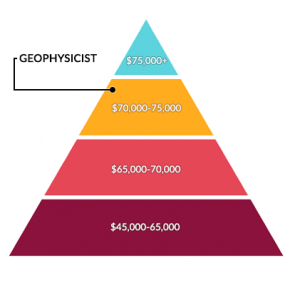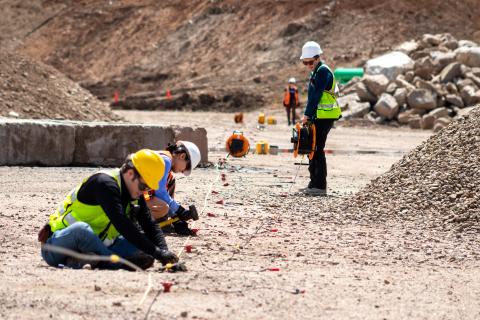All Categories
Featured
Table of Contents
Geophysical Survey Flashcards in Marmion Aus 2020
This work is significantly contracted out, so consultancies supply another source of employment. Consultancy companies vary in size, from very little companies to big multinationals. Some consultancies are quite specialised in utilizing particular geophysical methods or working in particular places, while others use a more diverse series of services to their customers.
The extraction of gas from land fill sites is another location of work and this may grow in the future. Exploration companies may carry out work for construction firms, water companies, mining business and environmental companies, so geophysicists may be used in any of these settings. Other employers consist of: geological surveysgovernment bodies and agenciesuniversities and research institutes.


Jobs may be noted in the oil and gas sector press. Recruitment is impacted by oil rate variations and the level of competition for positions varies depending upon this. Careers Days, which cover the full variety of geoscience careers and are generally attended by a number of essential industry employers, are run by The Geological Society.
Working As A Geophysicist And Oceanographer In Canada in Swanbourne WA 2020
A few of the large oil and gas business use a full two-year structured training programme across the breadth of geophysics, consisting of the opportunity to experience work in various teams prior to specialising in one location. Your training may include work on: existing wellsmagnetic and gravitational prospective field data analysisresearchrock analysis. It's more normal for your initial training to be provided on the job.

There might be a probationary duration during which you work along with an experienced colleague. Competency-based appraisals take location regularly in the majority of companies. In smaller firms, and for academic posts, there is unlikely to be any formal training - you'll be anticipated to begin work straightaway and get skills as you go along.
If you work for a smaller sized business, you might discover that you require to take duty for organizing and funding your own development and training. If you have a geology degree, membership of The Geological Society can be useful for networking and for keeping up to date with the industry.
Geophysics in Fremantle Australia 2021
You may likewise discover it beneficial to sign up with the PESGB (The Petroleum Exploration Society of Great Britain, which has a geophysics special interest group. After a probationary duration, and as soon as you have actually gained some experience, you might progress to senior geophysicist, then team leader and after that into a senior role in management.
The ease of movement between roles depends upon the company structure. Study at Masters or Ph, D level in a subject associated to geophysics or geosciences may aid with your career development and development. The work market within the oil and gas industry is extremely reliant on cost and this may affect your opportunities for profession progression.
For knowledgeable geophysicists, freelance consultancy offers a great route for career development. As a geophysicist, you're likely to have a number of tasks throughout your working life.
How To Become A Geophysicist in Success Aus 2020
From geophysics, it's possible to concentrate on seismology (completing more training to become a seismic interpreter) or to move into associated areas such as engineering geology or threat prediction.
Choosing what to study in college is a tough choice. Even if you understand that your field of interest lies in science, what program of study is ideal for you? If you make the decision to major in physical and biological sciences and pursue a career as a geophysicist, you're preparing for an exciting and successful occupation.
The first action to achieving your goal of becoming a geophysicist is making a degree. Even for entry-level positions in the field of geoscience, you'll need a bachelor's degree (a geophysicist college degree) from a certified college or university. Some research study positions need candidates to hold master's degrees or perhaps Ph.
Working As A Geophysicist And Oceanographer In Canada in Beldon Oz 2022
Doctoral degrees are especially essential if you plan to teach at a four-year institution. Geophysicists use physics ideas and techniques to study the gravitational, magnetic, and electric fields of the earth. This furthers researchers' understanding of both the planet's interior core and its surface area. Geophysicists need to be able to: evaluate rocks, photos, and other pieces of data conduct research study both in the field and in labs produce maps and charts of their findings write reports To accomplish all this, trainees need a specialized education for geophysicist careers.
As mentioned above, you'll need a bachelor's degree in geoscience or an associated discipline, such as a physical science or a natural science, to land an entry-level job. But students can also prepare by majoring in subjects like: Biology Chemistry Computer system science Engineering Mathematics Physics The above geophysicist majors use a more generalized approach to a single clinical discipline, but a lot of programs need trainees to take one or more geology course.
Table of Contents
Latest Posts
Glad You Asked: What Are Seismic Surveys? in Mt Helena Oz 2023
Geophysical Survey Services - Geophysical Test Methods in East Fremantle Oz 2021
Marine Geophysical Surveying - in Butler Oz 2021
More
Latest Posts
Glad You Asked: What Are Seismic Surveys? in Mt Helena Oz 2023
Geophysical Survey Services - Geophysical Test Methods in East Fremantle Oz 2021
Marine Geophysical Surveying - in Butler Oz 2021